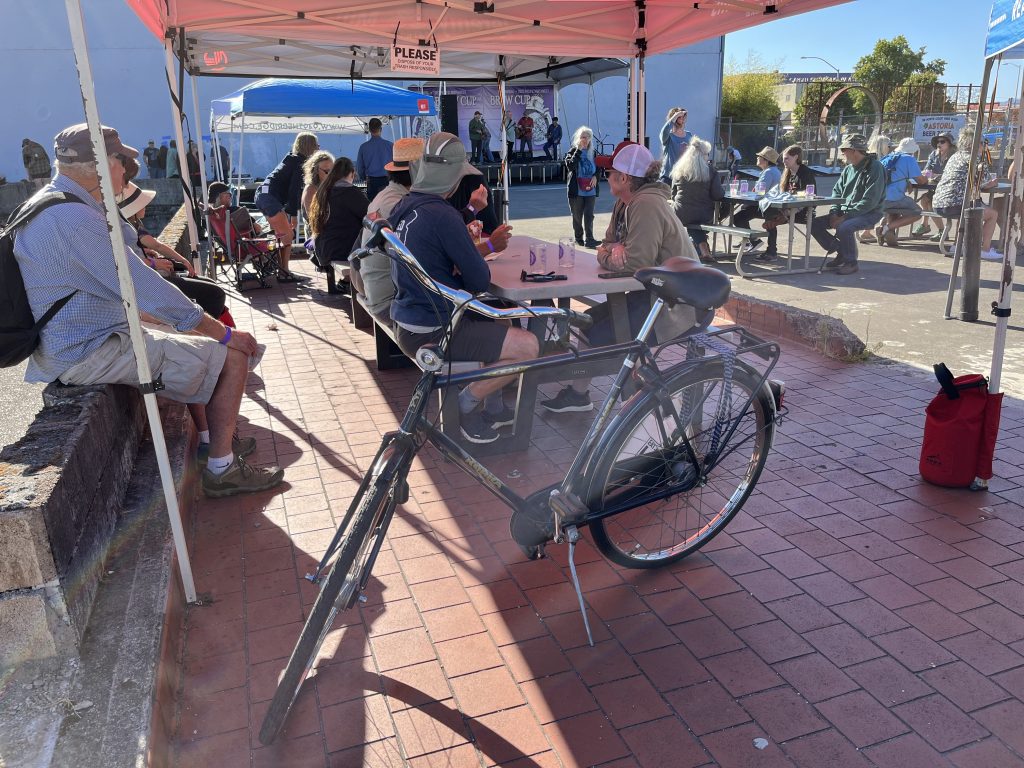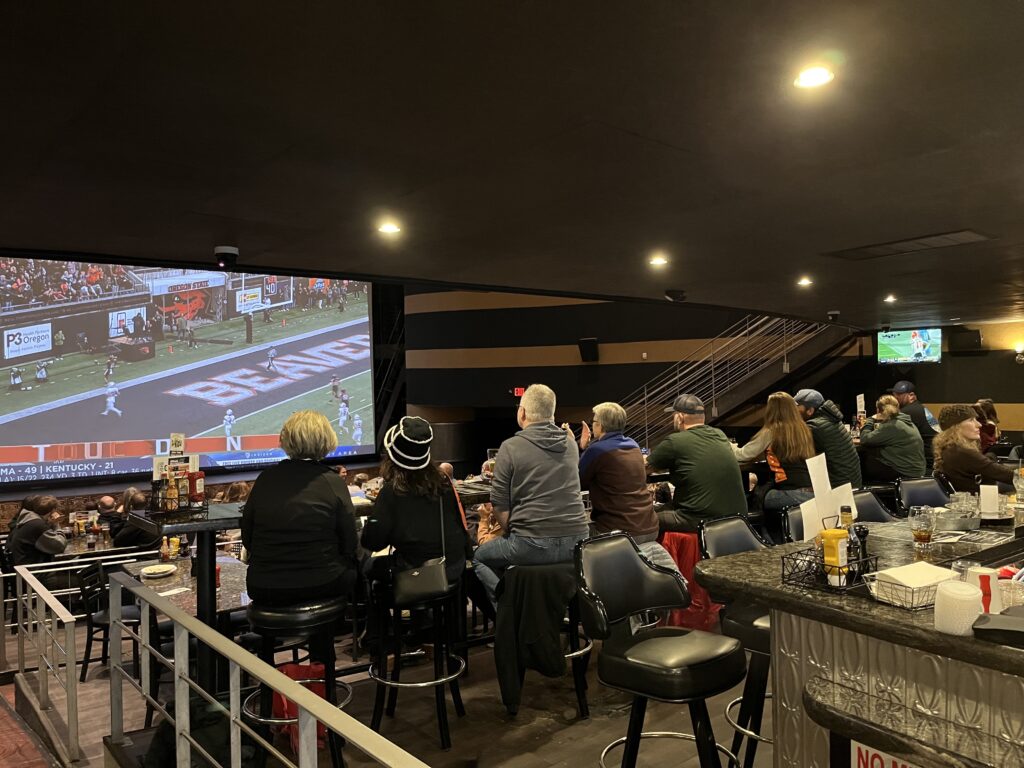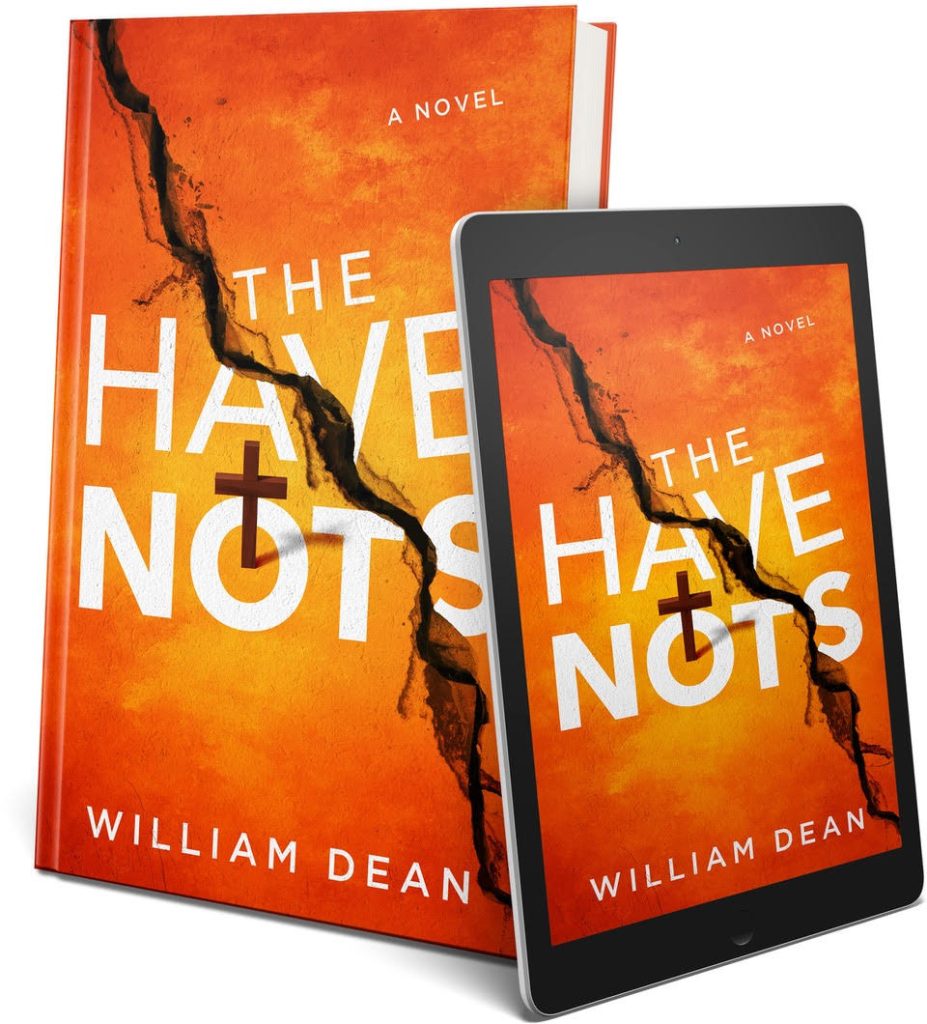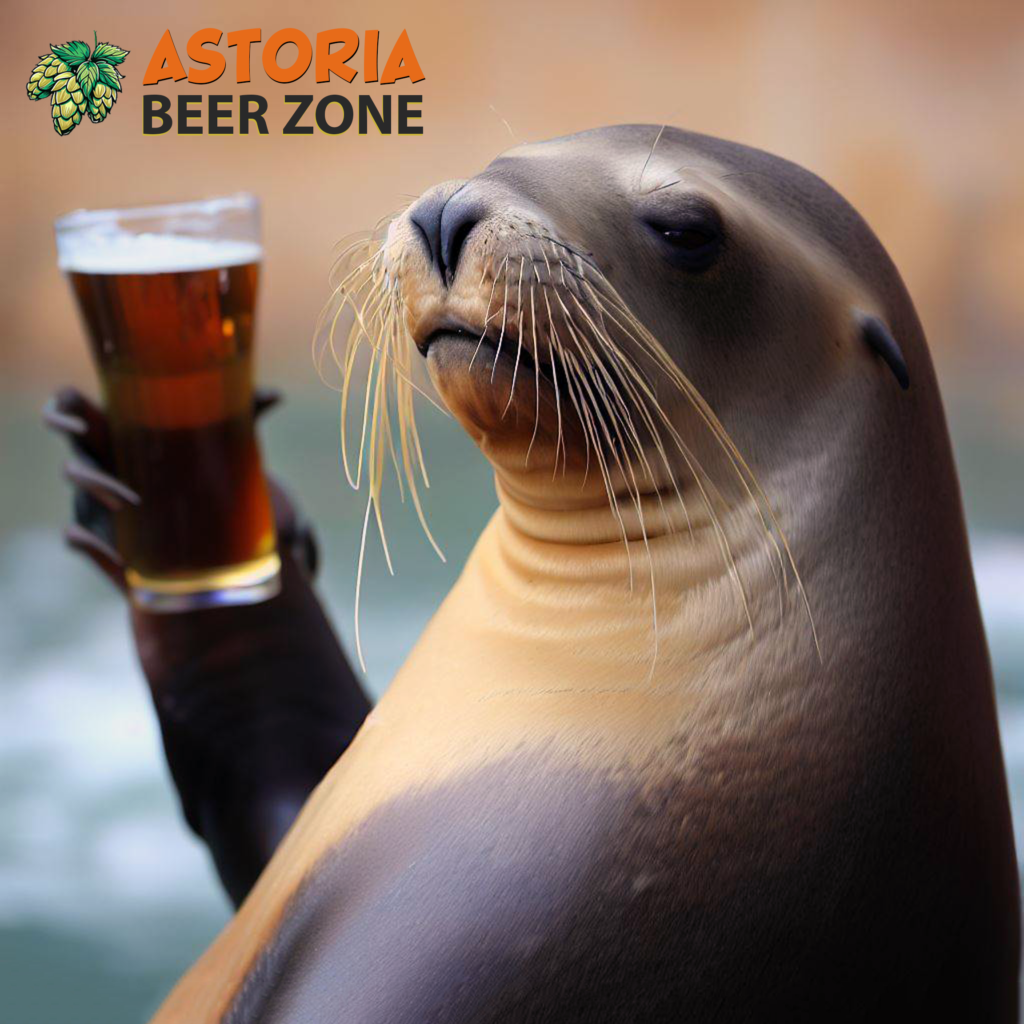Josh Allison wears many hats – brewer, business owner, family man – but in each role he seems, well, comfortable. Burly and bearded, quick to smile, he radiates fortitude like only someone who has overcome adversity can.
That inner strength has been a blessing, especially during that white-knuckle period when the pandemic struck just as his fledgling Astoria brewery, Reach Break Brewing, was hitting its stride. At the time crippling state restrictions kicked in, “99 percent” of Reach Break’s profits were tied to draught beer sales.
Today, the brewery is healthier than ever – on track to notch record sales, with a new hard seltzer line taking flight.
Astoria Beer Zone sat down recently with Allison for a wide-ranging discussion:
Q: You were a home brewer and wine maker for years before you took the plunge, opening Reach Break in 2017. How did you know you were good at your craft?
Q: What convinced you to open a brewery, and how big of a risk was it at the time?
A: I enjoyed my stuff. Other people enjoyed my stuff. I think once other people start giving you good feedback, that’s the first step. … Then there’s entering something in the home brew competitions, where you’re getting completely blind judging and unbiased feedback. It’s one thing if you’re hanging out in the garage and say, ‘Hey, try this IPA I just made,’ versus a trained beer judge who doesn’t even know who you are. Getting that kind of feedback is very beneficial as well.
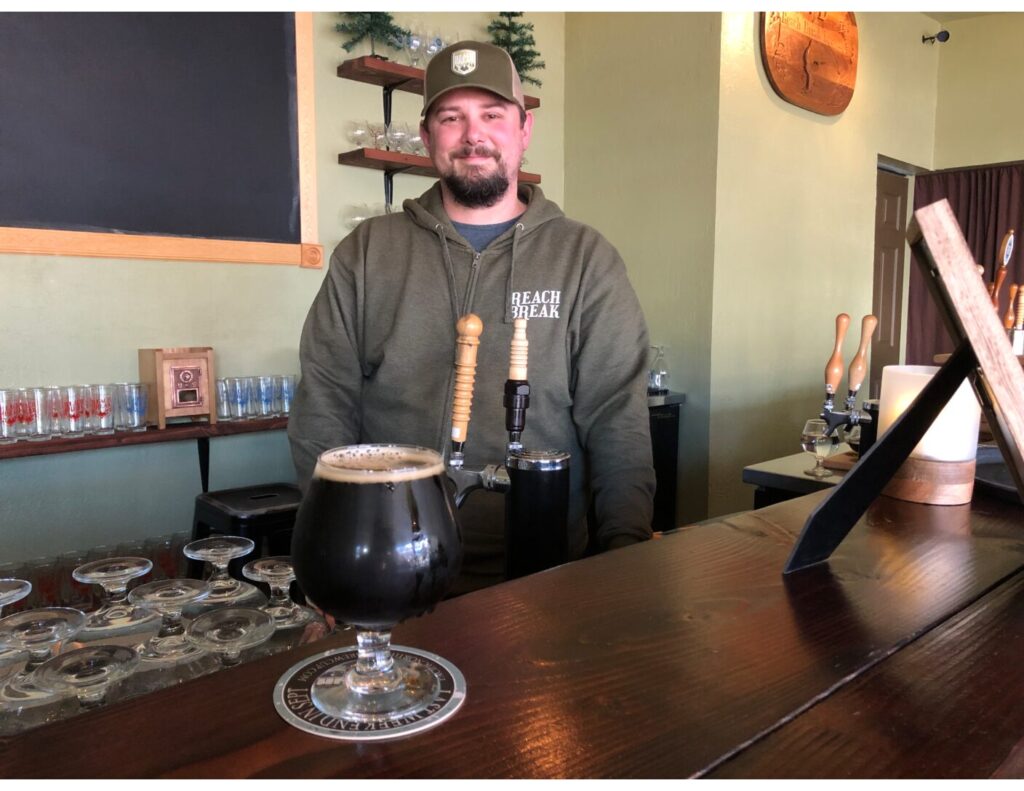
A: It was one of the things I’ve always had a passion for. A future goal of mine was always to open a brewery, and to a degree I think that’s not uncommon. I wouldn’t say every home brewer aspires to do that, but a lot do – I’d like to have my own place someday – but it was always a someday conversation.
[Ultimately, he decided to give up the labors of field work as a fish biologist after consulting with his wife]. It was like, let’s do it, but let’s be smart about this move: Enroll in school, get some class work, get some foundational elements for the business side as well.
Q: When you started brewing commercially did you ever doubt that you’d succeed?
A: Short answer: Yes, absolutely. Any small business owner is going to tell you the same thing if they’re being honest. So, you have those day-to-day concerns – and then you throw the pandemic in the mix.
At that point, it wasn’t even a dollar-and-cents cash flow situation. It was, ‘You are not legally allowed to open that door and have people congregate.’ So many unknowns. You’re like, eventually there will be a vaccine, eventually we’ll overcome this. At the time, we had some people say this will be done by April. And then you had people saying we’re going to be in this situation for a decade-plus. Where are we going to fall?
Back then, we sold over 99 percent of our production right here. So … it was done. [Makes a cracking sound]. We were right at the cusp of starting wholesale distribution, but all of our investment at the time for wholesaling was for draught. So, we were going to enter the market in keg format and then use that to cash-flow cans and bottle production.
Q: Was that a nerve-wracking time?
A: Oh yeah. Totally. And for society in general.
Q: When did you know Reach Break was going to make it?
A: I think it was that first summer, when you looked out and the patio was completely full of people. … We couldn’t make enough beer even to pour for our own patio.
Q: You’ve described the pandemic as bitter-sweet for your business: Draught sales dried up, but you also had the tank space to experiment with hard seltzer and other brews that are now very successful.
A: Yeah, [pandemic-related closures] allowed us the opportunity to play with some other things. Mess around with different yeast strains, things like that. Huge silver lining in that regard that really helped get us to where we are today. There’s always pros and cons to everything. As tough as it was in the moment, we are benefiting from some of that now.
Q: Have you expanded your original 7-barrel brewing system?
A: Nope. We’ve expanded our cellar, but it’s the original brewhouse still. We started out with the brewhouse, four fermenters and two brights. We’ve expanded our fermentation capacity, but we still use the same brewhouse to fill the tanks we’ve added.
Q: Reach Break’s downtown location is the site of a former Lovell Auto Co. used-car lot. It’s a real gem today, in the heart of the beer zone, complete with picnic tables and food trucks. Is that what you visualized six years ago?
A: It was what I visualized. It was surprising how quick it happened, because at the time of build-out there really wasn’t anything here on Duane Street. We had the rear entrance to JC Penney, the distillery, which at the time was North Coast Distilling, and then you had Fort George up the road. We had the vision, but the fact that it took off that first summer was pretty awesome.
The plan from the beginning was always to run with the food truck model. I liked that symbiotic relationship with other business owners, and allowing us all to run our unique passion products.
Q: How difficult was it to turn a used-car business into a brewery?
A: It was difficult. And I really under-estimated how much work that would take. You look at things like the bones and the structure, and you have the vision, so you’re like, ‘We can do this. This is what it will take.’ But then you get into the nitty gritty aspect of it and you’re like, ‘This is a lot more work than I anticipated.’
Q: There are now six breweries in Astoria, plus a couple of brewpubs run by outside breweries. A microbrewery offering gluten-free beer may open next to you in the fall. What’s your take on this beer boom?
A: I love it. We’re seeing more and more entry into the marketplace and with that comes more diversity in the form of not only products offered but experiences offered. So, everybody has their own vibe, their own unique personality.
It’s awesome, because craft beer has always been kind of a safe place for inclusivity and acceptance. It’s cool to see places that maintain that same vibe – they’re on the same highway but maybe in different lanes. … And it’s also great for consumers because they are able to find places where they’re fully enjoying their experience.
Q: You’re expecting record sales this year, which seems remarkable given the increased competition. Why have you been so successful?
A: Competition can be tough, but it can also be a blessing. It makes you up your game. It really makes you do better than you did the day before. When we opened [the taproom], this was just a garage bay. We put a bar in it, but it was really basic. Now, the interior décor and atmosphere has changed considerably. One could say if we were the only place in town would it have been such a necessity?
With all these places opening that are craft beer-centric, it also puts our town on the map for beer tourism. Now people can come to Astoria specifically for this niche micro-industry, these craft destinations. And keep coming back, keep coming back, keep coming back.
Q: Is all this growth sustainable, or are we going to start to see some North Coast breweries close in the near future?
A: [Long pause]. On the surface that sounds like a simple question. But you can’t really come up with a simple, easy answer to that. When you have 10,000 craft breweries in the country, is that sustainable? I think the answer is yes, but with an asterisk.
Things also have to change and adapt. You can’t just open a brewery now and say ‘ABC Acme Brewing Co., here we are’ and expect people to flood in anymore. The industry is maturing and I think it’s for the better. You have to offer great product now or you won’t survive. You have to offer a quality experience or you won’t survive. And you have to have an identifiable social persona that is authentic.
As far as sustainability goes … when you look at the market share that craft beer holds, you’re still only producing about 10 percent of overall beer consumption. There’s so much room for craft beer to grow.

